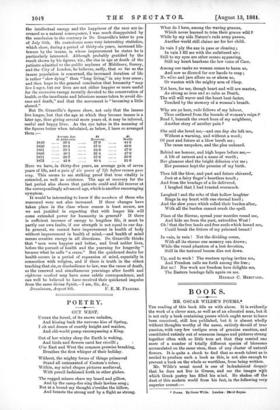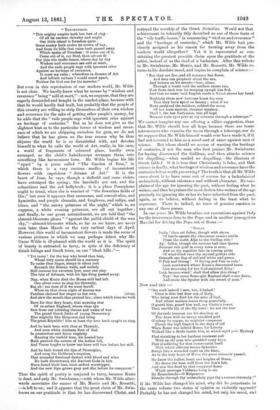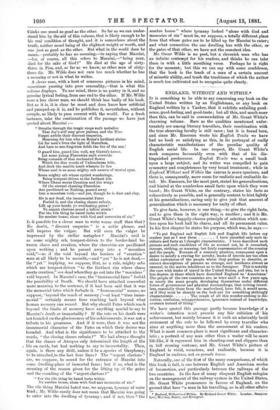BOOK S.
MR. OSCAR WILDE'S POEMS.*
THE reading of this book fills us with alarm. It is evidently the work of a clever man, as well as of an educated man, but it is not only a book containing poems which ought never to have- been conceived, still less published, but it is almost wholly without thoughts worthy of the name, entirely devoid of true passion, with very few vestiges even of genuine emotion, and constituted entirely out of sensuous images and pictures strung together often with so little true art that they remind one more of a number of totally different species of blossoms accumulated on the same stem, than of any cluster of natural- flowers. It is quite a shock to find that so much talent as is needed to produce such a book as this, is not also enough to prevent a book on the whole so worthless, from being written.
Mr. Wilde's usual mood is one of lackadaisical despair that he does not live in Greece, and see the images with which Greek poetry has filled his mind. He shakes off the dust of this modern world from his feet, in the following very superior sonnet :—
• Poems. By Oscar Wilde. London : David Bone.
" THEOKETIKOS.
"This mighty empire bath but feet of clay : Of all its ancient chivalry and might Our little island is forsaken quite : Some enemy hath stolen its crown of bay, And from its hills that voice bath passed away Which apake of Freedom : 0 come out of it, Come out of it, my Soul, thou art not fit For this vile traffic-house, where day by day Wisdom and reverence are sold at mart, And the rude people rage with ignorant cries Against an heritage of centuries.
It mars my calm ; wherefore in dreams of Art And loftiest culture I would stand apart, Neither for God nor for his enemies."
But even in this reprobation of our modern world, Mr. Wilde is not clear. We hardly know what he means by" wisdom and reverence" being" sold at mart," —not, we suppose, that they are eagerly demanded and bought in the market-place, because with that he would hardly find fault, but probably that the people of
-this country are willing to strip themselves of their own wisdom and reverence for the sake of getting other people's money, for he adds that the "rude people rage with ignorant cries against
an heritage of centuries." But as he does not give us the slightest hint as to the particular forms of wisdom and rever- ence of which we are stripping ourselves for gain, we do not believe that he has given us the true reason why he thus abjures the world he is so dissatisfied with, and devotes himself to what he calls the world of Art, really, in his case, a world of fragments of coloured glass, hardly even arranged, as the child's kaleidoscope arranges them, into something like harmonious form. Mr. Wilde begins his life " apart " by a poem called "The Garden of Eros," in which there is a very curious medley of inconsistent flowers with capricious " dreams of Art." It is the
heart of June, he says, though a daffodil and some violets have outstayed the spring ; the harebells are out, and the columbines and the red hollyhock ; it is a place Persephone ought to tread, when she is wearied of "the flowerless fields of
Dis ;" but soon it appears that anemones, and convolvulus, and hyacinths, and purple clematis, and foxgloves, and oxlips, and irises, and "the snowy primrose of the night," which is, we suppose, a white evening primrose, are all out together ; and finally, to our great astonishment, we are told that "the almond-blossoms gleam" "against the pallid shield of the wan sky,"—almond-blossoms which, so far as we know, are never seen later than March or the very earliest days of April.
However, this world of inconsistent flowers is made the scene of various pictures in which we may perhaps detect why Mr.
Oscar Wilde is ill-pleased with the world as it is. The spirit of beauty is entreated to tarry, in spite of the deficiency of Greek foliage and Greek trees, on our "bleak hills :"—
" Yet tarry ! for the boy who loved thee best,
Whose very name should be a memory To make thee linger, sleeps in silent rest Beneath the Roman walls, and melody Still mourns her sweetest lyre, none can play The lute of A.donais, with his lips Song passed away.
Nay, when Keats died the Muses still had left One silver voice to sing his threnody, But ah ! too soon of it we were bereft When on that riven night of stormy sea Panthea claimed her singer as her own, [alone, And slew the month that praised her; since which time we walk
'Save for that fiery heart, that morning star
Of re-arisen England, whose clear eye Saw from our tottering throne and waste of war The grand Greek limbs of young Democracy Rise mightily like Hesperus and bring The great Republic ! him at least thy love hath taught to sing, And he hath been with thee at Thessaly, And seen white Atalanta fleet of foot
In passionless and fierce virginity
Hunting the tusked boar, his honied lute Bath pierced the cavern of the hollow hill, And Venus laughs to know one knee will bow before her still.
And he hath kissed the lips of Proserpine, And sung the Galilwan's requiem, That wounded forehead dashed with blood and wine He hath discrowned, the Ancient Gods in him Have found their last, most ardent worshipper, And the new Sign grows grey and dim before its conqueror."
Thus the spirit of poetry is conjured to tarry, because Keats is dead, and only Mr. Swinburne,—with whom Mr. Wilde after- wards associates the names of Mr. Morris and Mr. Rossetti, —is left to us ; and it appears that the great claim of Mr. Swin- burne on our gratitude is that he has discrowned Christ, and restored the worship of the Greek divinities. Would not that achievement be tolerably fitly described as one of those feats of the "vile traffic-house," in renouncing "wisdom and reverence" and the "heritage of centuries," which Mr. Wilde had pre- viously assigned as his reason for turning away from the modern world altogether ? Yet it is represented as con- stituting the greatest possible claim upon the gratitude of the artist, instead of as the deed of a barbarian. After this tribute to Mr. Swinburne, Mr. Morris, and Mr. Rossetti, Mr. Wilde re- turns to his desolate mood, and begins to complain of science :—
"But they are few, and all romance has flown,
And men can prophesy about the sun, And lecture on his arrows—how, alone, Through a waste void the soulless atoms run, How from each tree its weeping nymph has fled, And that no more 'mid English reeds a Naiad shows her head.
3lethinks these new Actmons boast too soon That they have spied on beauty ; what if we Have analyzed the rainbow, robbed the moon Of her most ancient, chastest mystery, Shall I, the last Endymion, lose all hope
Because rude eyes peer at my mistress through a telescope!"
We cannot imagine any one offering a sillier suggestion, than that Mr. Wilde should lose all hope because there are lunar astronomers who examine the moon through a telescope, nor do we suppose that Mr. Wilde himself would ever have made it, if it had not occurred to him as a novel sort of sneer against men of science. But whom should we accuse of wasting the heritage of centuries, if not the man who first praises Mr. Swinburne for having discrowned the Galilean, and then attacks science for dispelling,—what needed no dispelling,—the illusions of Greek fable ? If it is true that Christianity is false, and that science is deadly, what heritage of wisdom and reverence have the centuries left us worth preserving? The truth is that all Mr. Wilde cares about is to have some sort of excuse for a lackadaisical melancholy, without substance and without character. He com- plains of the age for ignoring the past, without feeling what he writes; and then he praises the most destructive writers of the age precisely for ignoring the riches we have inherited from the past, again, as we believe, without feeling in the least what he expresses. There is, indeed, no trace of genuine emotion in any one of these poems.
In one poem Mr. Wilde breathes out execrations against Italy for the irreverence done to the Pope, and in another panegyrises Mazzini for driving the Pope out of Rome :—
" ITALIA.
Italia thou art fallen, though with sheen
Of battle-spears thy clamorous armies stride From the north Alps to the Sicilian tide !
Ay! fallen, though the nations hail thee Queen Because rich gold in every town is seen, And on thy sapphire lake in tossing pride Of wind-filled vans thy myriad galleys ride Beneath one flag of red and white and green.
0 Fair and Strong ! 0 Strong and Fair in vain !
Look southward where Rome's desecrated town Lies mourning for her God-anointed King !
Look heaven-ward ! shall God allow this thing ?
Nay ! but some flame-girt Raphael shall come down, And smite the Spoiler with the sword of pain."
Now read this :— "One such indeed I saw, but, Ichabod !
Gone is that last dear son of Italy, Who being man died for the sake of God, And whose uprisen bones sleep peacefully.
0 guard him, guard him well, my Giotto's tower,
Thou marble lily of the lily town ! let not the lour
Of the rude tempest vex his slumber, or The Arno with its tawny troubled gold O'erleap its merge, no mightier conqueror Clomb the high Capitol in the days of old When Rome was indeed Rome, for Liberty
Walked like a Bride beside him, at which sight pale Mystery
Fled shrieking to her farthest sombrest cell With an old man who grabbled rusty keys, Fled shuddering for that immemorial knell With which oblivion buries dynasties Swept like a wounded eagle on the blast, As to the holy heart of Rome the great triumvir passed.
He knew ths holiest heart and heights of Rome, He drave the base wolf from the lion's lair, And now lies dead by that empyreal dome Which overtops Valdarno hung in air By Brunelleschi-0 Melpomene Breathe through thy melancholy pipe thy sweetest threnody !"
If Mr. Wilde has changed his mind, why did he perpetuate in the same volume two states of opinion so violently opposed? Probably he has not changed his mind, but only his mood, and thinks one mood as good as the other. So far as we can under- stand him by the aid of this volume, that is likely enough to be his real condition of thought, and it is somewhere about the truth, neither mood being of the slightest weight or worth, and one just as good as the other. But what in the world does he mean,—probably he has no meaning,—in saying that Mazzini, —far, of course, all this refers to Mazzini,—" being man, died for the sake of God?" He died at the age of sixty- three in Pisa, and, so far as we know, as other men of sixty- three die. Mr. Wilde does not care too much whether he has a meaning or not in what he writes.
A clever man, with a host of sensuous pictures in his mind, sometimes passing into pure sensuality,—that is what this volume displays. To our mind, there is no poetry in it, and no genuine lyrical feeling, from one end to the other. If Mr. Wilde were a less clever man, we should think less badly of his book.
But as it is, it is clear he must and does know how artificial and pumped-up it is, and he publishes it, nevertheless, without scruple, as likely to pass current with the world. For a fresh instance, take the continuation of the passage we have just quoted about Mazzini :—
"Breathe through the tragic stops such melodies That Joy's self may grow jealous, and the Nine Forget awhile their discreet emperies,
Mourning for him who on Rome's lordliest shrine Lit for men's lives the light of Marathon, And bare to sun-forgotten fields the fire of the sun !
0 guard him, guard him well, my Giotto's tower, Let some young Florentine each eventide Bring coronals of that enchanted flower Which the dim woods of Vallombrosa hide, And deck the marble tomb wherein he lies Whose soul is as some mighty orb unseen of mortal eyes.
Some mighty orb whose cycled wanderings, Being tempest-driven to the farthest rim Where Chaos meets Creation and the wings Of the eternal chanting Cherubim Are pavilioned on Nothing, passed away Into a moonless void,—and yet, though he is dust and clay, He is not dead, the immemorial Fates Forbid it, and the closing shears refrain, Lift up your heads, ye everlasting gates !
Ye argent clarions sound a loftier strain !
For the vile thing he hated lurks within Its sombre house, alone with God and memories of sin."
Is it possible for a clever man to write worse stuff than that ?
No doubt, " discreet emperies " is a noble phrase, and will impress the vulgar. But will even the vulgar be impressed by the stellar metaphor ? Mazzini's soul is
as some mighty orb, tempest-driven to the border-land be- tween chaos and creation, where the cherubim are pavilioned upon nothing ; and he passed away into a "moonless void,"—as if the void beyond the borders of " creation " were at all likely to be moonlit,—and " yet " he is not dead,—
the " yet " implying, we suppose, that, as a rule, mighty orbs which are tempest-driven "to the furthest rim where chaos meets creation," are dead when they go out into the " moonless " void beyond. In Mazzini's case, the "immemorial fates" forbid the possibility of Death. We should have attached somewhat more meaning to the sentence, if it had been said that it was the memorial fates which forbade it. "Immemorial" means, we suppose, 'beyond the reach of memory ;'—at least "time imme- morial" certainly means time reaching back beyond what human memory can record. But why should Fates which reach beyond the limits of memory have anything special to say to Mazzini's death or immortality ? If the veto on his death were not founded on the gloriousness of his achievements, it was not a tribute to his greatness. And if it were, then it was not the immemorial character of the Fates on which their decree was founded. And what is the significance to be attached to the words, the closing shears refrain ?" We had always thought that the shears of Atropos only determined the length of the life on earth, but had nothing to say to immortality. Then, again, is there any drift, unless it be a species of blasphemy, to be attached.to the last four lines ? The "argent clarions" are, we suppose, to sound for the entrance of Mazzini into some dwelling-place of immortal fame ; but if so, what is the meaning of the reason given for the lifting up of the gates and the sounding of the "argent clarions ?"
For the vile thing be hated lurks within Its sombre house, alone with God and memories of sin."
The vile thing Mazzini hated was, we suppose, tyranny of some kind ; Mr. Wilde surely does not mean that Mazzini was going to enter into the dwelling of tyranny ; and if not, then "the sombre house" where tyranny lurked "alone with God and memories of sin" must be, we suppose, a totally different place from that whose gates are to be lifted up for Mazzini to enter; and what connection the one dwelling has with the other, or the gates of that other, we have not the remotest idea.
Mr. Oscar Wilde is no poet, but a cleverish man who has an infinite contempt for his readers, and thinks he can take them in with a little mouthing verse. Perhaps he is right for the moment; but this we can say with some confidence, that the book is the trash of a man of a certain amount of mimetic ability, and trash the trashiness of which the author is much too cultivated not to recognise quite clearly.
































 Previous page
Previous page